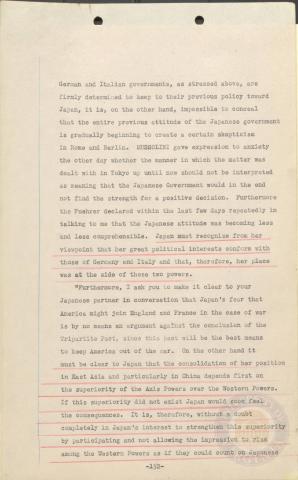
Page 152
| Parent | Collaboration Between Japan, Germany and Italy Volume III |
|---|---|
| Date | 23 February 1940 |
| Language | English |
| Collection | Tavenner Papers & IMTFE Official Records |
| Box | Box 15 |
| Folder | Japan, Germany, Italy Collaboration Vol 3 |
| Repository | University of Virginia Law Library |
German and Italian governments, as stressed above, are firmly determined to keep to their previous policy toward Japan, it is, on the other hand, impossible to conceal that the entire previous attitude of the Japanese government is gradually beginning to create a certain skepticism in Home and Berlin. MUSSOLINI gave expression to anxiety the other day whether the manner in which the matter was dealt with in Tokyo up until now should not be interpreted as meaning that the Japanese Government would in the end not find the strength for a positive decision. Furthermore the Fuehrer declared within the last few days repeatedly in talking to me that the Japanese attitude was becoming less and less comprehensible. Japan must recognize from her viewpoint that her great political interests conform with those of Germany and Italy and that, therefore, her place was at the side of these two powers*
"Furthermore, I ask you to make it clear to your Japanese partner in conversation that Japanfs fear that America might join England and France in the case of war is by no means an argument against the conclusion of the Tripartite Pact, since this pact will be the best means to keep America out of the war. On the other hand it must be clear to Japan that the consolidation of her position in East Asia and particularly in China depends first on the superiority of the Axis Powers over the Western Powers. If this superiority did not exist Japan would soon, feel the consequences. It is, therefore, without a doubt completely in Japan's interest to strengthen this superiority by participating and not allowing the impression to rise among the Western Powers as if they could count on Japanese
